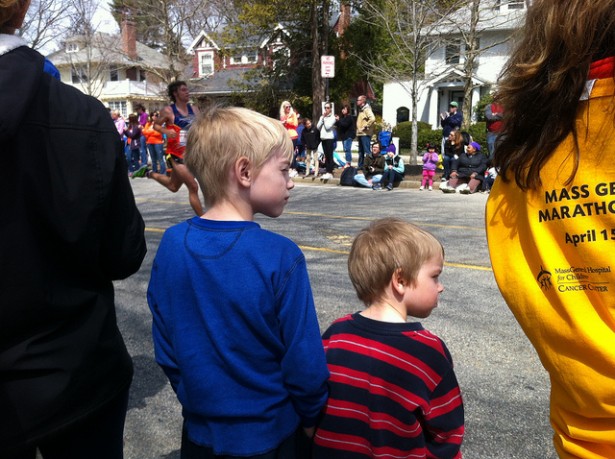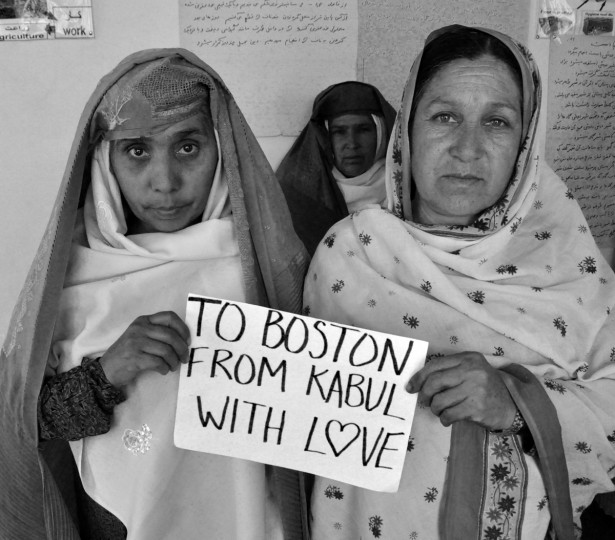
I grew up in Massachusetts — mere minutes away from where the Boston Marathon starts, depending on how fast you drive. Although I live in New York now, my parents are still there, and I called my mother yesterday to see how she was. I still hadn’t heard much about what had happened because I’d been out all afternoon, so she was filling me in on the few details that had emerged. She didn’t know anyone in the marathon this year, but nonetheless my mother broke into tears on the phone. She was talking about how this Patriots’ Day had started so well — as a public holiday in the city of Boston, many people had the day off from work, and many more had been watching the Marathon in person along the route, or in their homes on TV. For some reason my mother was focusing on the weather before the bombs went off, and although never one to lack an opinion, in this case all she kept saying was, “It was such a beautiful day…”
I understand how she feels. I understand how something like this can make someone struggle for words to explain — or even process — what’s happened. This is the closest anything like this has ever been to her front door.
I want to switch now and talk about another beautiful day, in a slightly different part of the world: Afghanistan’s rural Uruzgan province, about a hundred miles northeast of Kandahar. The sun came up there the way it did in Boston, except about eight and a half hours earlier. Instead of there being a marathon to run, there was a wedding to be held for two beautiful people, celebrating with their families the two becoming one. In the lives of these two people, there couldn’t have existed a more beautiful day. What happened next, however, makes me embarrassed, disgusted and ashamed to have to write: U.S. Air Force planes bombed the wedding party, killing 30 people and injuring over a hundred. In the words of one of the village residents speaking to the BBC, “There are no Taliban or al Qaeda or Arabs here. These people were all civilians, women, and children.” Apparently in the jubilation immediately following the wedding ceremony, some of the guests had been firing their weapons into the air. Potentially mistaking it for anti-aircraft artillery fire, the Pentagon has admitted, “At least one bomb was errant. We don’t know where it fell.”
Why am I juxtaposing these two incidents? Is it because they happened on the same day? Well, no. Actually they didn’t. The annihilation of this particular wedding happened back in July 2002. After the bombing in Boston yesterday an article from the UK’s Daily Mail about the wedding attack began circulating on social media, with people insinuating that it had happened on the same day. The byline of that article has since been amended to prominently feature a date, but by not mentioning one earlier I misled the reader, as I myself had been momentarily misled. The truth is, yes, this actually happened; it just happened 11 years ago.
Does that make it any more palatable? Given a moment where we feel wounded as a nation, the posting of an old story masquerading as something new has the requisite power to shock people into making the very connection that needs to be made: namely, between the violence we visit upon people in foreign lands, and the violence that comes back to visit us at home. Violence begets violence, as Martin Luther King began teaching in the 1950s. Or in the words of Isaac Newton: Every action has an equal and opposite reaction. In an era when important news stories so often get lost amid celebrity pregnancies and partisan inanities, I found it quite refreshing to fall victim to such a minor Internet hoax. It did cause a certain amount of disbelief, as I thought I recalled something similar happening back in the early days of the war, as well as again in 2008. But I couldn’t really be all that offended by a story that’s actually newsworthy miraculously getting a second life.
According to the latest from what happened in Boston, three people have died, and over a hundred were injured — some having had limbs blown off in the attack. Much like my mother, I don’t have words to express my sadness, nor how much my heart goes out to everyone who’s been touched by this. It’s still too early to know who’s responsible, but that will come out in time. It could have been the work of a politically motivated group, or it could have been some deranged maniac, of the sort that killed 27 people at Sandy Hook or 12 people in Aurora, Colorado. But what we do know for sure is who killed those 30 people in Afghanistan. And fully understanding my complicity in the actions of my government, my heart goes out to everyone who was touched by that no less.
The question for us now is whether or not we’ll fall into the same trap we fell into after 9/11. Will we continue the cycle of violence in a misguided quest for justice? Or will we be smart enough to say: Okay, we get it now. Living in a place where bombs go off in public is hell. We’re sorry, Kabul. We’re sorry, Karachi. We’re sorry, Baghdad (where 30-plus people actually were killed yesterday in cities across Iraq). What’s happening where you live is largely our fault, and we promise to do whatever we can to make things better. If you think it will help we’ll fund reconstruction efforts, strengthen civil society, and build up the social services that can cut off local support for terrorist organizations. Whatever we do, though, we’ll definitely stop bombing you, flying our drones overhead, terrorizing your people, and destabilizing your society. Not because it’s wrong, though it most certainly is. And not because it undermines our own supposed goals, though it most certainly does, making our country more — not less — likely to be attacked. But because after Boston, we now have some idea of what it’s like.


Well said, thank you for fostering hope and dignity. May I add: this is yet another
chance for President Barack Obama to honour the Nobel Peace Prize granted to him before he chose to continue what his predecessors started. Every day is a beatiful day.
Thank you, Teresa. I agree with you completely. Still waiting on President Obama to somehow live up to that one. Someone has to break this cycle of violence, and as the first sitting president since Wilson to receive a Nobel, let’s hope he has some positive surprises in store.
Okay can’t make it any easier than this, use “hidefap.com” with firefox not Internet Explorer for almost full functionality.